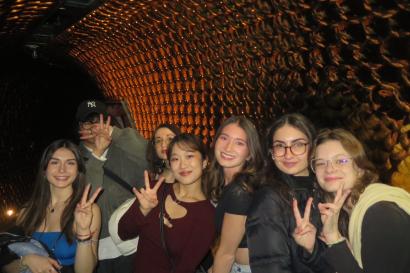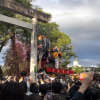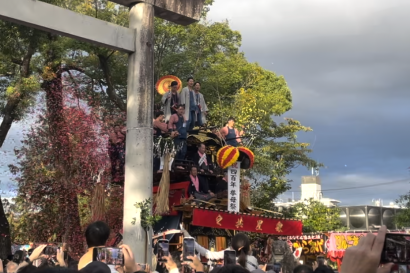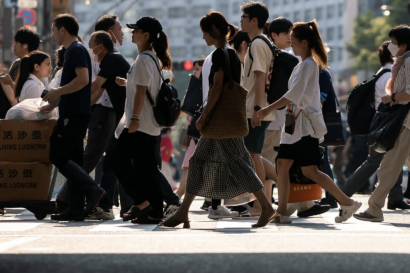I am proud to be many things: imaginative; a woman; a political science major; passionate; academic; a child of an immigrant; hard-working; a Harry Potter fan; a friend; biracial; and so much more. Among what I am proud of being is bisexual. This is a part of my identity among many that make up who I am. I understand that some people may not accept this about me or others, but no matter where I go and the environment that I am in, I surround myself with a community of people who love everything about who I am. In the United States, whether that be my home or college town, this is not hard to do because of the culture I was raised in. It is because of this culture that helped me feel comfortable with my sexuality and not even hesitate to write this blog. The reason for writing this is because there are certain challenges such as finding your community when moving towns in the States, but as a foreign student in Japan, there are new challenges altogether. This is of course because the culture and society of Japan are different from what I grew up in, and this includes their view on the queer community.
Because this was an anxiety of mine before starting at my host school, Nanzan University, I asked family members who live in Tokyo how they think the general public views the queer community in Japan. They said that the only real representation that they see is of transgender individuals on television called onee tarento. They mentioned a particularly famous talk show host of a game show as an example. Personally, I don’t see this to be any kind of real representation of this part of the community, as it is very performative and I wondered if this is how the general public views trans people. When I asked them about the gay community, they said that they don’t really talk about it, almost ever. I did not fully understand why this was the case until I learned about it in an LGBTQ+ unit in my “Japanese Society” class that I am taking as a Center for Japanese Studies (CJS) student at Nanzan University. In this course, I learned that in traditional Japanese society, sexuality and gender are inextricably intertwined, meaning that if you are of one sex, then you have one sexuality. Men like women, women like men, period. So the concept of queerness is confusing to the traditional Japanese mind, because if you like men, then you are a woman, and if you like women, then you are a man. Basically, to understand gayness, there is a belief that gay men are women trapped in men’s bodies and vice versa. Thus, their idea of transgender men and women are typically understood to have same-sex desires, even if they do not explicitly identify as such. It is because of this that the most visible in the LGBTQ+ community in Japan are trans women in the form of onee tarento. To the traditional Japanese mind, it is more easily digestible. It is quite an interesting and honestly confusing way to think about the queer community, so if you are interested in understanding this mindset in Japan, I recommend that you read the first source that I have posted below1. (A reading from my “Japanese Society” class)
Knowing all that I do now about the traditional mindset of the general population in Japan on queerness does not deter me from seeking out a welcoming and accepting community. Though this society may not be as accepting as it is in the States, that does not mean that everyone around me would not accept me. On the contrary, as I have gotten closer to Japanese students and become friends, I was not nervous or hesitant to speak openly about my identity because I know that most Japanese people my age are open to accepting and learning more without judgment. I have never felt hate or anger. If anything, just general curiosity or surprise. There is even a queer club at Nanzan University that meets weekly, so I know that the younger generation is changing the general mindset about queerness in Japan. To further drive home this point and to hopefully deter any worries that you might have before coming to live in Japan, I did further research on this topic in my society class. A certain study done in Japan found that most students in the study were supportive of LGBTQ+ rights, even when their responses often reflected how the broader Japanese society was less accepting. This shows that students subconsciously believe societal norms but are willing to critically think about the issue when given the opportunity2. As anyone in this community is aware, this is all that you can ask of anyone in any society– being open. In my opinion, though Japan is more socially conservative than the United States, this is a best-case scenario for a queer individual studying abroad!
Sources:
- Baudinette, T. (2020). Japanese gay men’s experiences of gender: Negotiating the hetero system. In J. Coates, L. Fraser, & M. Pendleton (Eds.) (2020). The Routledge Companion to Gender and Japanese Culture. Routledge.
- Lawrence, Luke, and Yuzuko Nagashima. “Exploring LGBTQ+ Pedagogy in Japanese University Classrooms.” ELT Journal, vol. 75, no. 2, April 2021, Pages 152–161
Emma Suzuki Szwajkowski
Hello, my name is Emma Suzuki Szwajkowski, I'm a fourth-year student at Penn State University studying International Politics and Japanese. During the 2024-2025 academic year, I am studying abroad at Nanzan University in Nagoya, Japan. Join me on my adventure!





